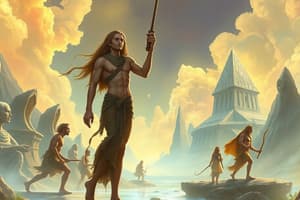Podcast
Questions and Answers
The Sumerians and Babylonians flourished in the Fertile Crescent and played a crucial role in the development of writing, astronomy, and ______.
The Sumerians and Babylonians flourished in the Fertile Crescent and played a crucial role in the development of writing, astronomy, and ______.
politics
The Egyptians were known for their amazing use of geometry and architecture, their legacy includes the pyramids and the ______ Stone.
The Egyptians were known for their amazing use of geometry and architecture, their legacy includes the pyramids and the ______ Stone.
Rosetta
The Minoans, a highly advanced civilization on the island of Santorini, were known for their intricate pottery, frescoes, and complex social and ______ structures.
The Minoans, a highly advanced civilization on the island of Santorini, were known for their intricate pottery, frescoes, and complex social and ______ structures.
political
The Indus Valley Civilization, located in the Indus River Valley, was known for its sophisticated urban planning, sanitation system, and evidence of trade networks extending from the Persian Gulf to the ______ Sea.
The Indus Valley Civilization, located in the Indus River Valley, was known for its sophisticated urban planning, sanitation system, and evidence of trade networks extending from the Persian Gulf to the ______ Sea.
The Roman Empire expanded to become the largest empire in the western world, exerting significant influence on language, law, government, and ______.
The Roman Empire expanded to become the largest empire in the western world, exerting significant influence on language, law, government, and ______.
Flashcards are hidden until you start studying
Study Notes
Unraveling Human History: A Journey Through Time
Human history spans a vast, intricate tapestry that weaves together the stories of our ancestors, the evolution of societies, and the rise and fall of civilizations across the globe. In this journey through time, we'll explore the fundamental threads of our past, shedding light on how these threads have been woven into the rich and diverse tapestry that we call history.
Early Human Origins
Our story begins approximately 2.8 million years ago with the appearance of Homo habilis, one of the first species of early humans. As the centuries passed, human evolution continued, leading to more advanced species like Homo erectus, Homo heidelbergensis, and ultimately Homo sapiens, our species, around 300,000 years ago.
Neolithic Revolution
Around 10,000 years ago, humans underwent a significant turning point in history with the Neolithic Revolution, which introduced farming and agriculture. This revolution marked the transition from nomadic hunter-gatherer societies to settled communities. As a consequence, population growth accelerated, leading to the emergence of the first cities and the formation of complex social hierarchies.
Civilizations: Ancient and Modern
Human history is peppered with stories of civilizations, each with their unique cultural, ideological, and technological advancements. Some of the most prominent civilizations throughout history include:
-
Sumerians and Babylonians (3000–600 BCE), who flourished in the Fertile Crescent and played a crucial role in the development of writing, astronomy, and politics.
-
Egyptians (3100 BCE – 332 BCE), known for their amazing use of geometry and architecture, their legacy includes the pyramids and the Rosetta Stone.
-
Minoans (2100 – 1450 BCE), a highly advanced civilization on the island of Santorini, known for their intricate pottery, frescoes, and complex social and political structures.
-
Indus Valley Civilization (2600 – 1900 BCE), located in the Indus River Valley, this civilization was known for its sophisticated urban planning, sanitation system, and evidence of trade networks extending from the Persian Gulf to the Caspian Sea.
-
Greece (800–323 BCE), with its philosophers, mathematicians, and scientist-politicians, this civilization played a pivotal role in Western civilization.
-
The Roman Empire (753 BCE – 476 CE), which expanded to become the largest empire in the western world, exerting significant influence on language, law, government, and architecture.
-
The Renaissance (14th – 17th centuries), a period of great cultural and intellectual rebirth in Europe, characterized by a revitalization of art, science, and literature.
-
The Industrial Revolution (18th – 19th centuries), marked by significant improvements in manufacturing and transportation, which transformed the world economy and laid the groundwork for modern society.
Notable Individuals and Events
History is a never-ending parade of notable individuals and events that have profoundly impacted humanity. Some of these include:
-
Socrates (469–399 BCE), an ancient Greek philosopher, who influenced Plato and inspired the Socratic method.
-
Confucius (551–479 BCE), a Chinese philosopher, whose teachings emphasized personal and governmental morality.
-
Mohandas Gandhi (1869–1948), a pioneer of non-violent civil disobedience, who led India to independence and inspired movements worldwide.
-
Martin Luther (1483–1546), a German theologian, whose ideas sparked the Protestant Reformation.
-
The Enlightenment (17th–18th centuries), a period of great intellectual and philosophical ferment in Europe, which gave rise to important thinkers such as John Locke, Voltaire, and Rousseau.
-
World Wars (1914–1945), a titanic struggle between the great powers of the world, which altered the course of history and led to the creation of the United Nations.
-
The Civil Rights Movement (1955–1968), a concerted effort to secure equal rights for African Americans, led by figures such as Martin Luther King Jr. and Malcolm X.
-
The Space Age (1957–present), characterized by the development of space technology, which opened new horizons for exploration and discovery.
Conclusion
History is a complex and fascinating tapestry, woven from the multifarious threads of human endeavor. To understand the present, we must delve into the past, examining the trials and triumphs of our ancestors, and the events and ideas that have shaped the world as we know it. By exploring history, we gain a deeper understanding of ourselves and the societies in which we live, making us better equipped to confront the challenges of the future.
Studying That Suits You
Use AI to generate personalized quizzes and flashcards to suit your learning preferences.




